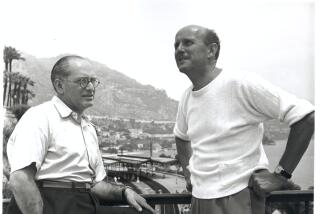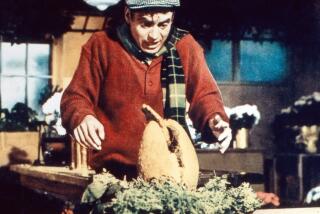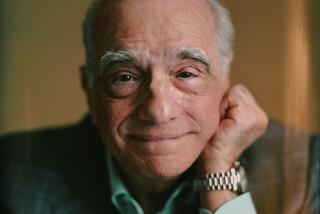Years of growth and greatness
- Share via
Martin Scorsese Collection
Warner Home Video, $60 for the set; $20 each
Auteur! Auteur!: This new set features five seminal films from the visionary, iconoclastic American director: “Who’s That Knocking at My Door?,” “Mean Streets,” “Alice Doesn’t Live Here Anymore,” “After Hours” and “GoodFellas.” Thanks to the perceptive, funny and at times brutally honest commentary tracks from Scorsese, viewers are able to track not only his growth and maturity as a director but also the winding path of his personal journey.
*
“Who’s That Knocking at My Door?”
Released in 1968, this low-budget, black-and-white semi-autobiographical dream was Scorsese’s first feature, an extension of student films he made at New York University. Harvey Keitel -- who loved to show off his naked body even then -- stars as a movie-loving Italian American living in New York’s Little Italy who falls for a beautiful WASP (Zina Bethune).
Extras: The featurette “From the Classroom to the Streets” includes an interview with screenwriter Mardick Martin, who worked as Scorsese’s directorial assistant on the film, and scene-specific commentary with Scorsese and Martin.
*
“Mean Streets”
After Scorsese directed the 1972 low-budget drama “Boxcar Bertha” for Roger Corman, he showed the film to his idol, John Cassavetes. The indie director told Scorsese the film wasn’t any good and that he should “go out and make something that comes from your heart.” The result is this exhilarating 1973 crime drama about a group of friends who are low-rent gangsters in New York’s Little Italy. Scorsese’s first film for a major studio, “Mean Streets” is marked by fluid camerawork, the star-making performances of a young Robert De Niro and Keitel, and the director’s expressionistic use of violence.
Extras: A fun vintage featurette, “Back on the Block,” and incisive scene-specific commentary from Scorsese.
*
“Alice Doesn’t Live Here Anymore”
When actress Ellen Burstyn chose this charming 1974 romantic comedy as her next project with Warner Bros., she told studio chief John Calley she wanted a young director to helm the project. After Calley showed her “Mean Streets,” Burstyn was so impressed with Scorsese, he was hired to direct “Alice.”
The film was a triumph for Burstyn, who won the best actress Oscar. Kris Kristofferson is sexy as Alice’s love interest.
Extras: A retrospective documentary and scene-specific commentary with Scorsese and the two stars.
*
“After Hours”
Scorsese had set up “The Last Temptation of Christ” at Paramount in 1983. But during preproduction, the studio canceled the film because of its hefty budget. Paramount’s abrupt pulling of the plug on “Christ,” which Scorsese would do five years later at Universal, sent him into a tailspin as he realized that Hollywood wasn’t interested in the type of films he wanted to make. Then producers Griffin Dunne and Amy Robinson, who had been in “Mean Streets,” submitted the script for “After Hours.” A dark comedy about a man’s (Dunne) Kafkaesque experience in the Greenwich/SoHo district of New York in the wee small hours, “After Hours” was just the type of offbeat, low-budget project Scorsese needed to turn himself around.
Extras: A retrospective documentary, deleted scenes and delectable commentary from Scorsese, Dunne, Robinson, cinematographer Michael Ballhaus and editor Thelma Schoonmaker.
*
“GoodFellas”
Most critics consider this 1990 mob thriller to be Scorsese’s crowning achievement. “GoodFellas” is based on Nicholas Pileggi’s book about the funny, violent and horrifying adventures of Henry Hill, a real-life New York gangster who eventually turned government witness and entered the FBI witness-protection program. Scorsese and Pileggi wrote the screenplay for this riveting, take-no-prisoners gangster flick filled with now-classic set pieces and Joe Pesci’s Oscar-winning turn as a psychotic, trigger-happy mobster. The performances by the rest of the cast, including Ray Liotta as Hill, Lorraine Bracco as his wife and De Niro as his mentor, are perfection.
Extras: Scene-specific commentary from Scorsese and members of the cast and crew, and commentary with Hill and ex-FBI agent Edward McDonald. The second disc features several above-average documentaries, including a retrospective on the making of the film and interviews with filmmakers who were influenced by the movie.
More to Read
Only good movies
Get the Indie Focus newsletter, Mark Olsen's weekly guide to the world of cinema.
You may occasionally receive promotional content from the Los Angeles Times.










